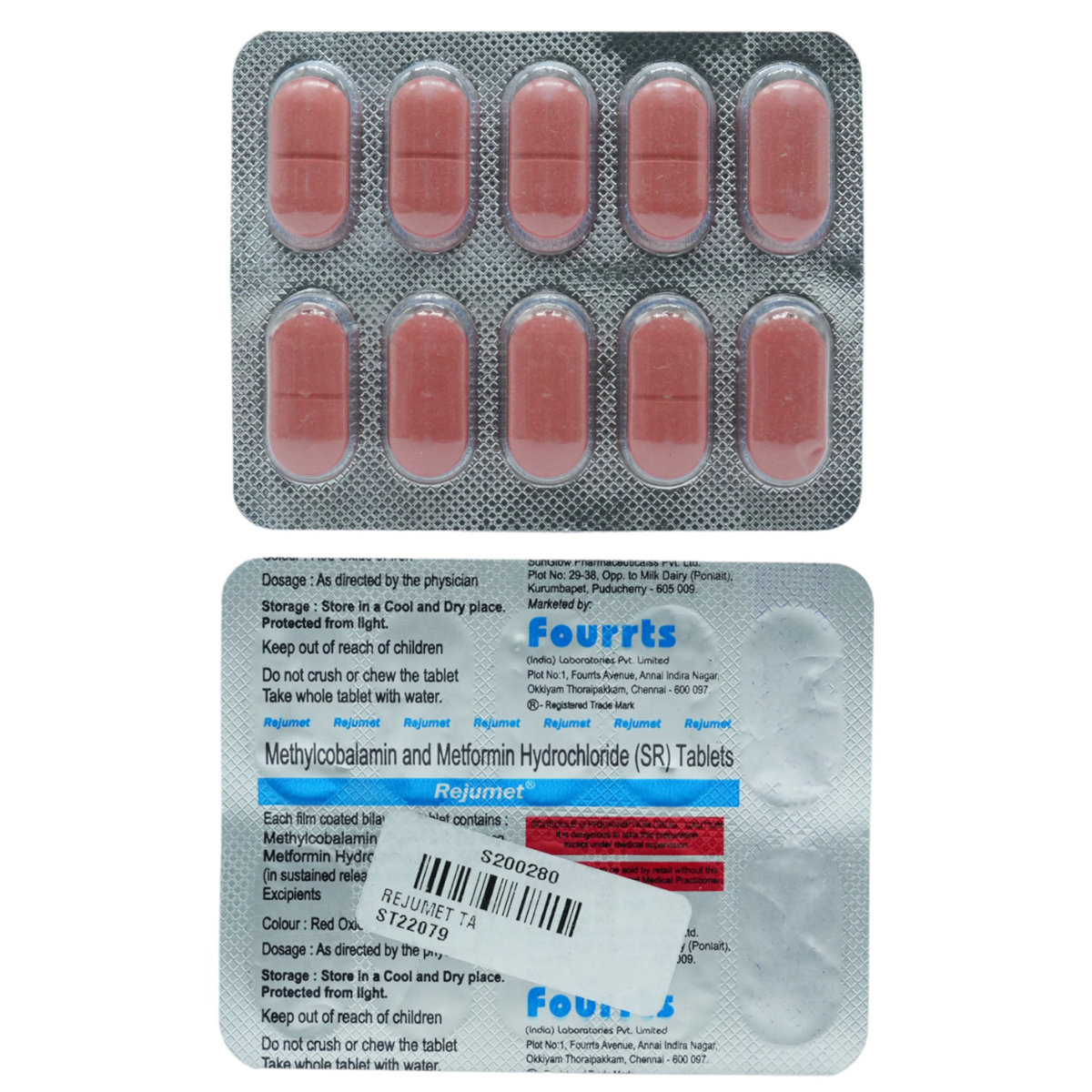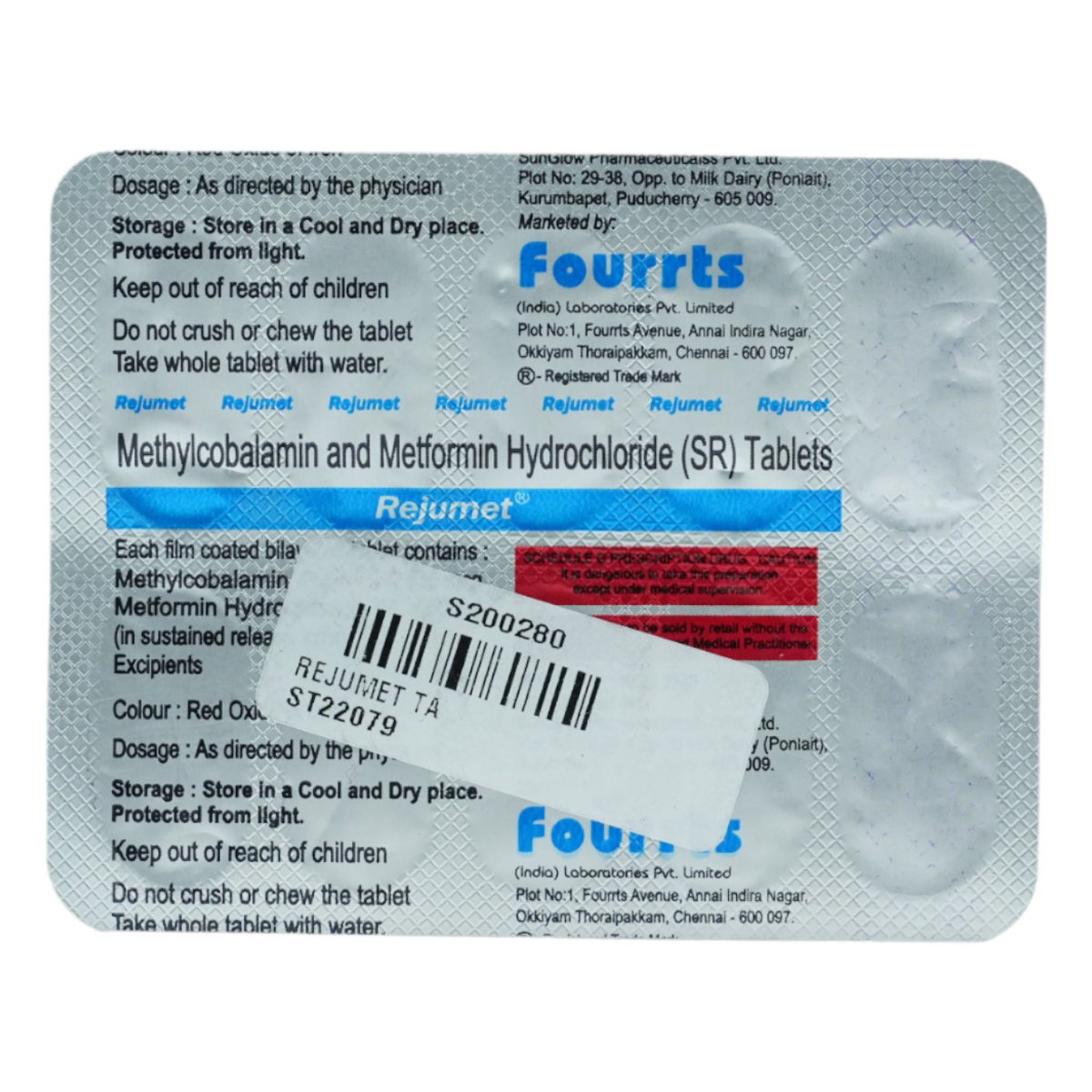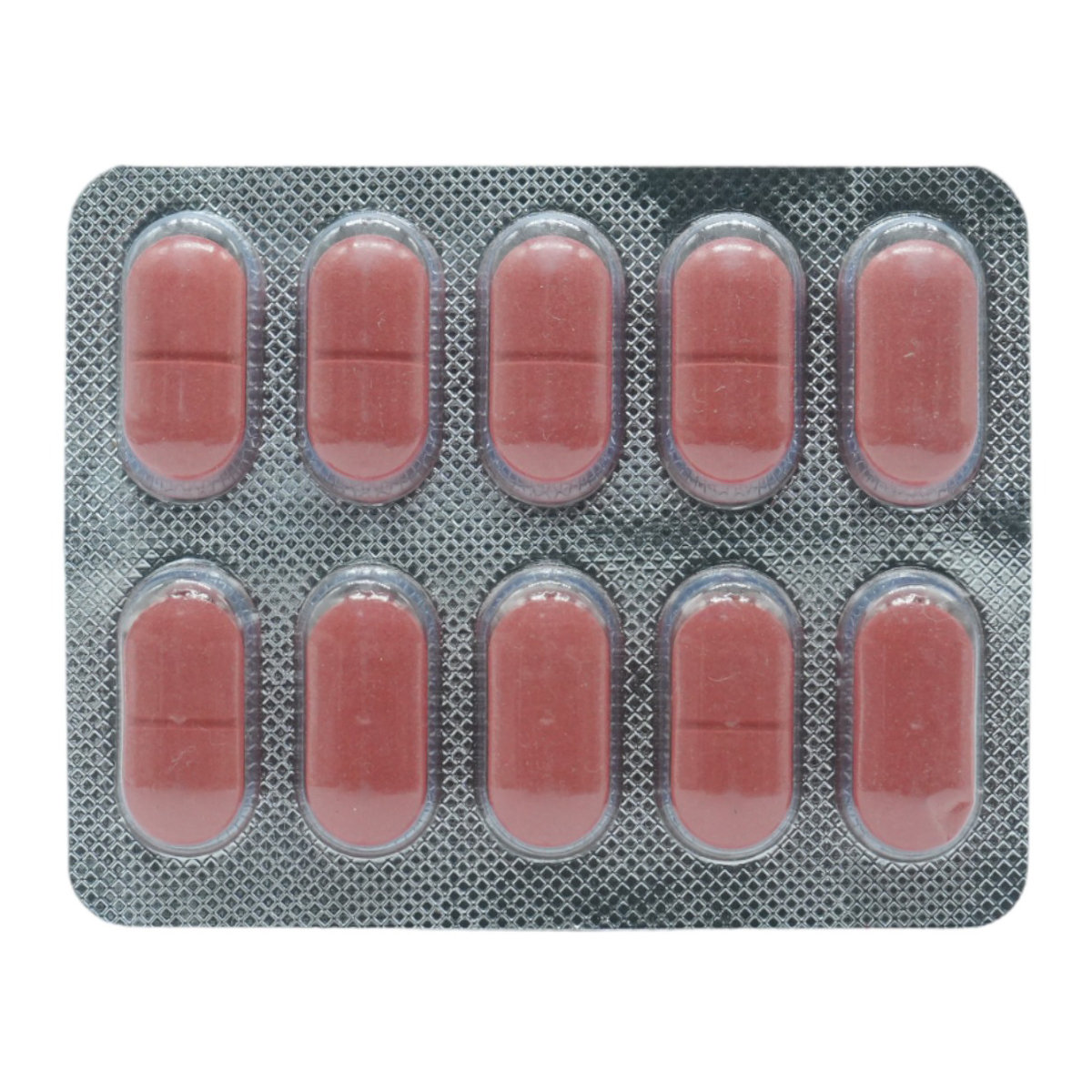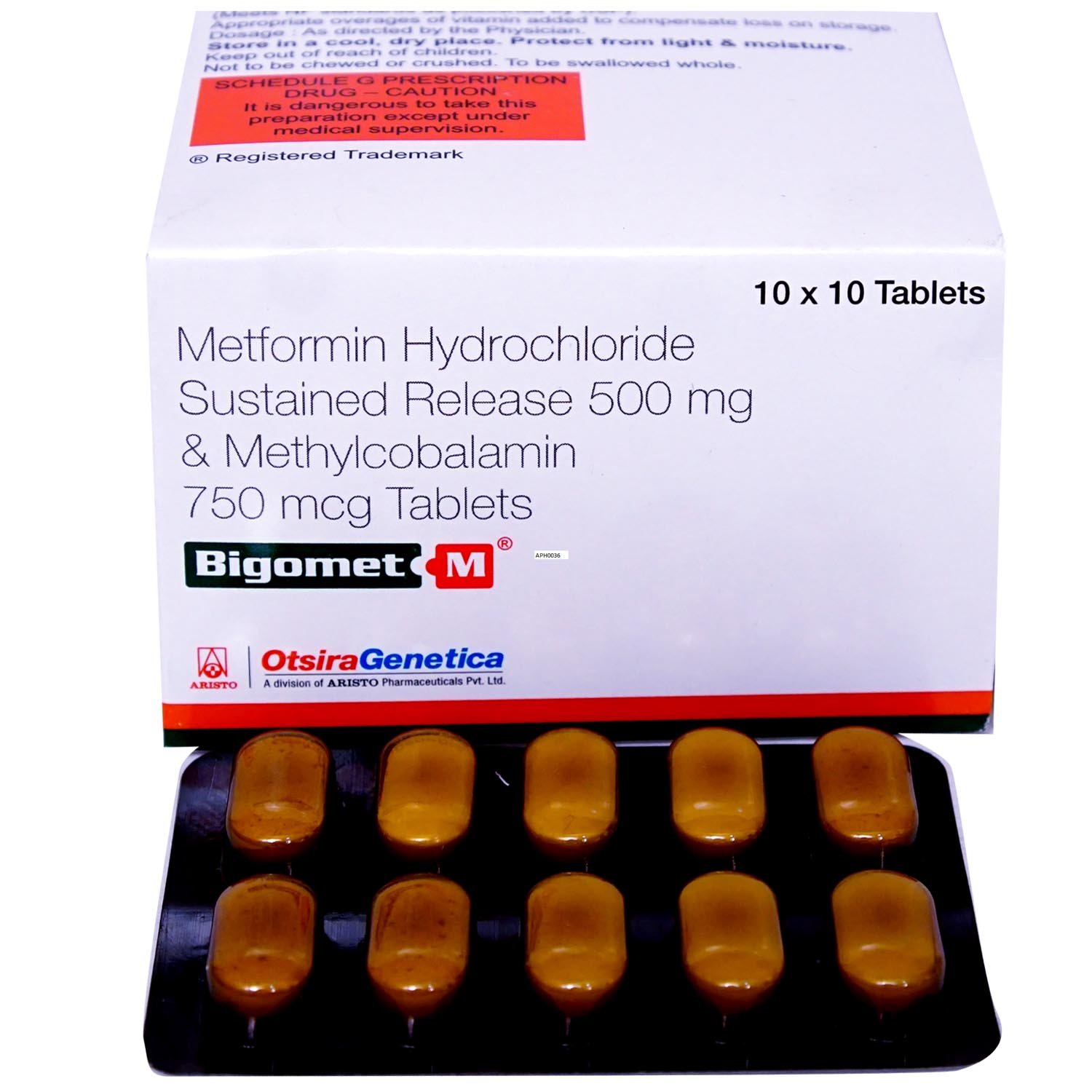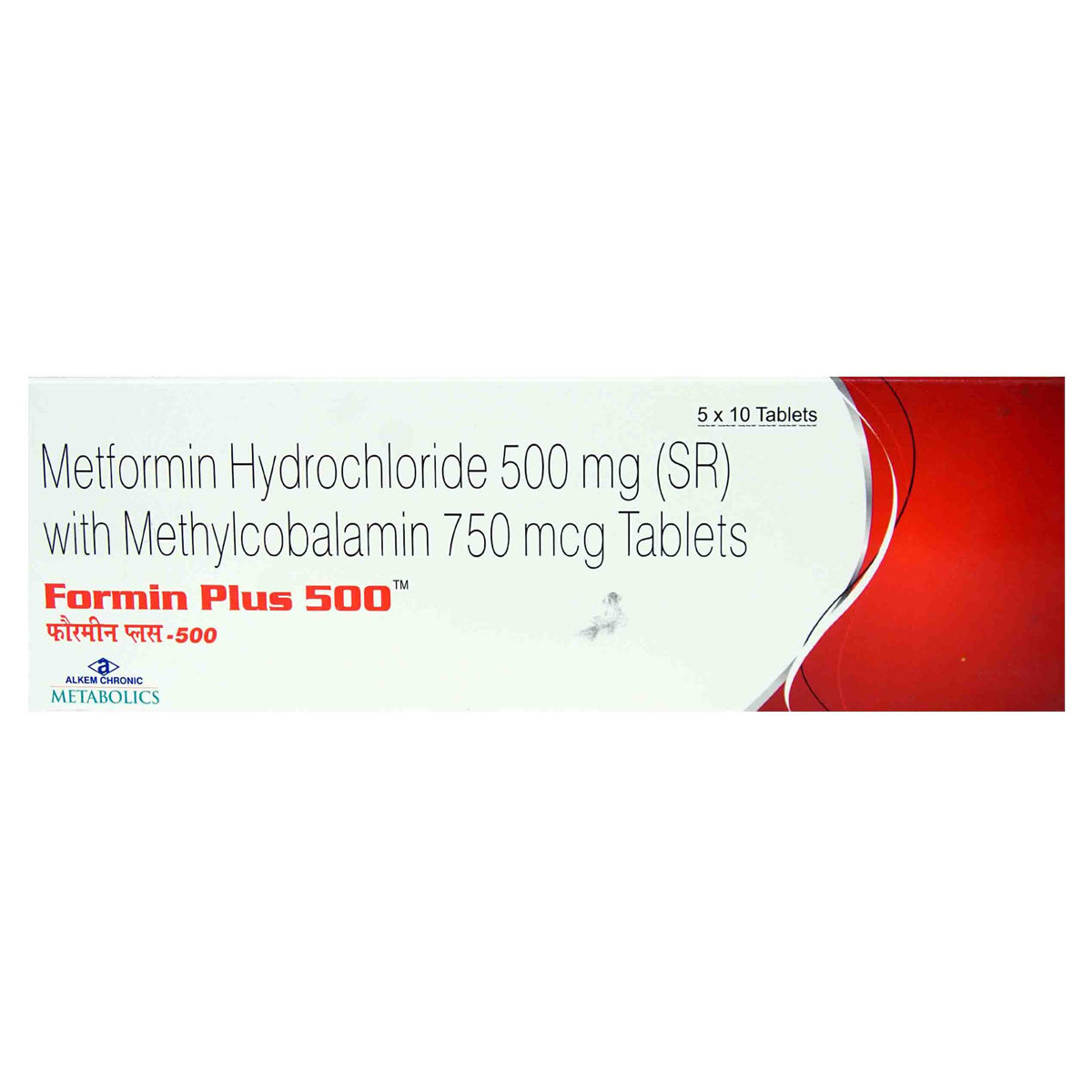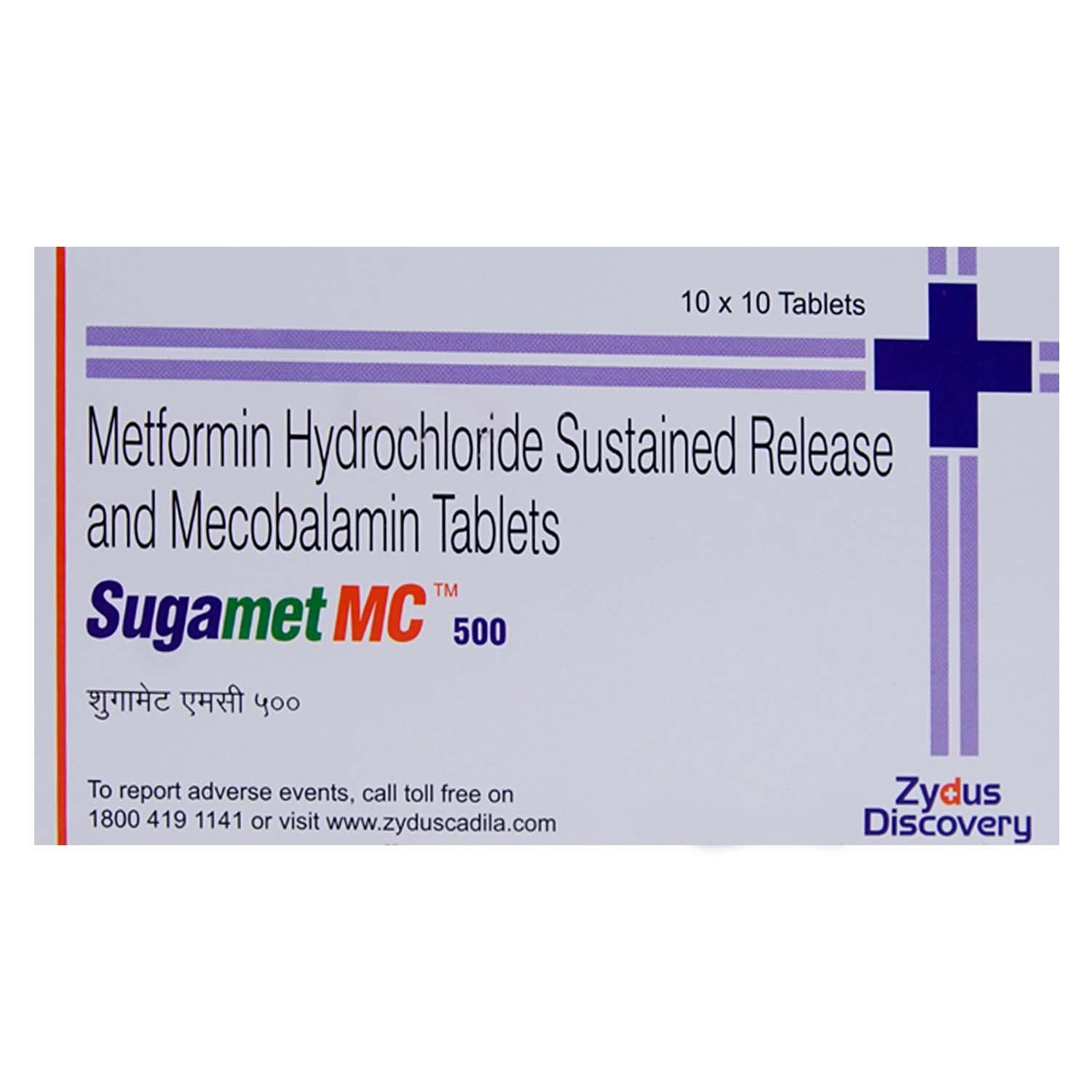Rejumet Tablet 10's
MRP ₹75.5
(Inclusive of all Taxes)
₹9.1 Cashback (12%)
Provide Delivery Location
Online payment accepted
 Prescription drug
Prescription drugWhats That
 30 people bought
30 people bought Composition :
Manufacturer/Marketer :
Consume Type :
Expires on or after :
Return Policy :
About Rejumet Tablet
Rejumet Tablet belongs to the group of medications called ‘anti-diabetic’ used in the treatment of Type 2 diabetes mellitus. Type 2 diabetes mellitus is a chronic or life-long condition in which blood sugar or glucose levels rise more than normal. It occurs when the body does not produce enough insulin (metabolizes glucose), or if produced, it cannot function properly in the body.
Rejumet Tablet is a combination of two medicines, namely: Metformin and Methylcobalamin. Metformin acts by decreasing liver glucose production and intestinal glucose uptake. It may deplete vitamin B12 levels. So, it is taken with methylcobalamin that can treat vitamin B12 deficiency. Thus, Rejumet Tablet does not cause a sudden lowering of the blood glucose level or significant hypoglycemia.
You should take this medicine as prescribed by your doctor. You may experience side-effects of such as changes in taste, nausea (feeling sick), vomiting (falling sick), diarrhoea, headache, anorexia (loss of appetite), and sweating. Inform your doctor if any of these side-effects persist or worsen.
Do not take Rejumet Tablet if you are allergic to any of its contents. Before taking Rejumet Tablet , inform your doctor if you have liver problems, severe kidney failure, uncontrolled diabetes, dehydration due to severe diarrhoea or vomiting, severe infections, acute heart failure or heart attack, and alcoholism. Also, inform your doctor if you are pregnant, planning to become pregnant, or breastfeeding.
Uses of Rejumet Tablet
Directions for Use
Key Benefits
Rejumet Tablet is a combination of two medicines, namely: Metformin and Methylcobalamin. Metformin acts by decreasing liver glucose production and intestinal glucose uptake. Methylcobalamin reduces vitamin B12 deficiency. Rejumet Tablet does not cause significant hypoglycemia (sudden lowering of the blood glucose level). It is usually preferred in obese patients with diabetes as it may cause weight loss and lowers the complications of diabetes.
Storage
- Drink water or other clear fluids.
- To prevent worsening of pain, limit intake of tea, coffee, or alcohol.
- Include bland foods like rice, toast, crackers, and rice in your diet.
- Avoid lying down immediately after eating as it may cause indigestion or heartburn.
- Avoid acidic and spicy food as it may cause indigestion.
- Inform Your Doctor: Notify your doctor immediately about your diarrhoea symptoms. This allows them to adjust your medication or provide guidance on managing side effects.
- Stay Hydrated: Drink plenty of fluids to replace lost water and electrolytes. Choose water, clear broth, and electrolyte-rich drinks. Avoid carbonated or caffeinated beverages to effectively rehydrate your body.
- Follow a Bland Diet: Eat easy-to-digest foods to help firm up your stool and settle your stomach. Try incorporating bananas, rice, applesauce, toast, plain crackers, and boiled vegetables into your diet.
- Avoid Trigger Foods: Steer clear of foods that can worsen diarrhoea, such as spicy, fatty, or greasy foods, high-fibre foods, and dairy products (especially if you're lactose intolerant).
- Practice Good Hygiene: Maintain good hygiene to prevent the spread of infection. To stay healthy, wash your hands frequently, clean and disinfect surfaces regularly, and avoid exchanging personal belongings with others.
- Take Anti-Diarrheal Medications: If your doctor advises, anti-diarrheal medications such as loperamide might help manage diarrhoea symptoms. Always follow your doctor's directions.
- Keep track of your diarrhoea symptoms. If they don't get better or worse or are accompanied by severe stomach pain, blood, or dehydration signs (like extreme thirst or dark urine), seek medical help.
- Frequent flossing and brushing can help remove bacteria and debris that can give your teeth a metallic taste.
- The metallic flavor may be caused by a zinc deficiency. Eat foods like meat, chicken, and oysters that are high in zinc.
- Reducing the intake of foods with strong aromas, like onions and garlic, as they may intensify the taste of metallic substances.
- Avoid smoking and tobacco products as they may intensify the metallic flavor.
Drug Warnings
Rejumet Tablet may cause a rare and serious side-effect ‘lactic acidosis’ (buildup of lactic acid in the blood), characterized by abdominal pain, muscle cramps, vomiting, severe fatigue, and difficulty breathing. It is a life-threatening condition that requires immediate medical attention. Inform your doctor if you have any severe liver or kidney problems as their normal functioning is required to eliminate excess lactic acid from the body. Do not consume excess alcohol as it increases the risk of lactic acidosis. It should be used with caution in patients with heart diseases as it increases the risk of heart failure. If you have dehydration (severe loss of body fluids) due to severe vomiting, diarrhoea, exposure to heat, or fever, stop taking Rejumet Tablet and immediately seek medical attention. Rejumet Tablet may cause electrolyte imbalance, so taking this medicine during dehydration can worsen the condition.
Drug-Drug Interactions
Drug-Drug Interactions
Login/Sign Up
Co-administration of Rejumet Tablet and Iodamide can increase the risk of lactic acidosis (when the body produces too much lactic acid).
How to manage the interaction:
Taking Rejumet Tablet with Iodamide is generally avoided as it can result in an interaction, please consult your doctor before taking it.
Co-administration of Rejumet Tablet and Iobenzamic acid can increase the risk of lactic acidosis (when the body produces too much lactic acid).
How to manage the interaction:
Taking Rejumet Tablet with Iobenzamic acid is generally avoided as it can result in an interaction, please consult your doctor before taking it.
Co-administration of Rejumet Tablet with Metrizamide together can cause the risk of lactic acidosis (when the body produces too much lactic acid ).
How to manage the interaction:
Taking Rejumet Tablet with Metrizamide is generally avoided as it can possibly result in an interaction, it can be taken if a doctor has advised it. However, if you experience headaches, muscle cramps or pain, contact a doctor immediately. Do not discontinue any medications without consulting a doctor.
Co-administration of Iopydol with Rejumet Tablet can increase the risk of side effects.
How to manage the interaction:
Taking Rejumet Tablet with Iopydol is not recommended, please consult your doctor before taking it.
Co-administration of Rejumet Tablet and Iocarmic acid can increase the risk of lactic acidosis (when the body produces too much lactic acid).
How to manage the interaction:
Taking Rejumet Tablet with Iocarmic acid is generally avoided as it can result in an interaction. please consult your doctor before taking it.
Co-administration of Iodixanol with Rejumet Tablet can increase the risk of side effects.
How to manage the interaction:
Taking Rejumet Tablet with Iodixanol is not recommended, please consult a doctor before taking it. Do not discontinue the medications without consulting a doctor.
Co-administration of Rejumet Tablet and Iobitridol can increase the risk of lactic acidosis (when the body produces too much lactic acid).
How to manage the interaction:
Taking Rejumet Tablet with Iobitridol is generally avoided as it can result in an interaction. Please consult your doctor before taking it.
Co-administration of Ioversol with Rejumet Tablet can increase the risk of side effects.
How to manage the interaction:
Taking Rejumet Tablet with Ioversol is not recommended, please consult your doctor before taking it.
Co-administration of Iopamidol with Rejumet Tablet can increase the risk of side effects.
How to manage the interaction:
Taking Rejumet Tablet with Iopamidol is not recommended, please consult a doctor before taking it. Do not discontinue the medications without consulting a doctor.
Co-administration of Iotroxic acid with Rejumet Tablet can increase the risk of side effects.
How to manage the interaction:
Taking Rejumet Tablet with Iotroxic acid is not recommended, please consult your doctor before taking it.
Drug-Food Interactions
Drug-Food Interactions
Login/Sign Up
Diet & Lifestyle Advise
- Fill your half plate with starchy veggies, a quarter with proteins, and a quarter with whole grain.
- Eat at regular intervals. Do not take the long gap between a meal or snack.
- Monitor your blood sugar level regularly, especially when there are a lot of fluctuations.
- Invest at least 150 min of moderate-intensity physical activity and 15 minutes of high-intensity exercise every week.
- Lose weight gradually to achieve a healthy body mass index (18.5 to 24.9).
- Replace refined carbohydrates containing whole-grain foods and increase intake of fruits and veggies and other fibre-enriched foods.
- Reduce intake of saturated fat (or hidden fats) in food like chips, crisps, pastries, biscuits, and samosas. Choose omega 3 fatty acid-containing oils for daily cooking. You may use palm oil, mustard oil, groundnut oil, rice bran oil, and safflower oil for frying.
- Do not take stress as it may elevate your blood sugar level. You may adopt stress management techniques like mindfulness, yoga, or meditation to control stress-related blood sugar changes.
- Opt for low-fat dairy products (low-fat yoghurt, fat-free milk, and cheese, etc.).
- Keep your blood pressure as normal (120/80) as possible as it reduces the risk of cardiovascular diseases in diabetes patients.
Side Effects of Rejumet Tablet
- Change in taste
- Nausea (feeling sick)
- Vomiting (being sick)
- Diarrhoea
- Hot sensation
- Headache
- Anorexia (loss of appetite)
- Sweating
Habit Forming
Therapeutic Class
All Substitutes & Brand Comparisons
RX
Out of StockMetnurite 500mg/750mcg Tablet SR
Centaur Pharmaceuticals Pvt Ltd
₹51.69
(₹4.65 per unit)
29% CHEAPERRX
Out of StockCureformin MC 500mg/750mcg Tablet SR
Curega Healthcare Pvt Ltd
₹70
(₹6.3 per unit)
5% CHEAPERRX
Bigomet M Tablet 10's
Aristo Pharmaceuticals Pvt Ltd
₹88
(₹7.92 per unit)
19% COSTLIER
Drug-Diseases Interactions
Drug-Diseases Interactions
Login/Sign Up
FAQs
Drug-Drug Interactions Checker List
- IBUPROFEN
- CELECOXIB
- CIMETIDINE
- OMEPRAZOLE
- SALBUTAMOL
- DOLUTEGRAVIR
- TOPIRAMATE
- LAMOTRIGINE
- NEOMYCIN
- VERAPAMIL
- RIFAMPICIN
- TRIMETHOPRIM
- RANOLAZINE
- VANDETANIB
- ISAVUCONAZOLE
Special Advise
Beware of hypoglycemia (low blood sugar level) symptoms include sweating, dizziness, palpitations, shivering, intense thirst, dry mouth, dry skin, frequent urination, etc. Whenever you experience these symptoms, try to eat 5-6 candies or 3 glucose biscuits or 3 teaspoons of honey/sugar and get in touch with your doctor. Make sure you carry these with you at all times, especially for long travels.
Disease/Condition Glossary
Type 2 Diabetes Mellitus: It is a chronic or lifelong disease that keeps the body away from properly utilizing insulin. Hence, people affected with type 2 diabetes either do not produce enough insulin, or there is resistance to the action of insulin. Middle-aged or older are most likely to suffer from type 2 diabetes, so it is also known as adult-onset diabetes. Symptoms of type 2 diabetes include increased thirst, frequent urination at night, slow wound healing, increased hunger, fatigue, and blurred vision. In some cases, there may be weight gain while in rare cases weight loss may be observed. The complication of type 2 diabetes also includes neuropathy (nerve problems), nephropathy (kidney problems), and retinopathy (damaged retina of eyes or blindness), loss of limbs, sexual dysfunction, and increase the chance of heart attack or stroke.

Have a query?
Alcohol
Safe if prescribed
Alcohol may increase the risk of side-effects and worsen the condition.
Pregnancy
Consult your doctor
Rejumet Tablet is a category B drug. It should be used in pregnant women only if clinically needed.
Breast Feeding
Consult your doctor
Rejumet Tablet should not be used in breastfeeding mothers as it may get secreted in the breast milk and cause unwanted effects in the nursing babies.
Driving
Safe if prescribed
Rejumet Tablet does not affect your ability to drive.
Liver
Consult your doctor
Rejumet Tablet should be taken with caution especially if you have a history of liver diseases. The dose may have to be adjusted by your doctor.
Kidney
Consult your doctor
Rejumet Tablet should be taken with caution in patients with kidney diseases. The dose may have to be adjusted by your doctor.
Children
Safe if prescribed
Rejumet Tablet can be used in children above 10 years of age if clinically required.
Recommended for a 30-day course: 3 Strips

